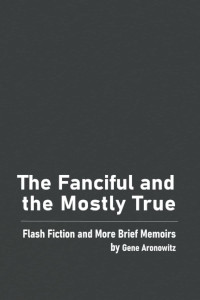Seething
By Gene Aronowitz
When I was growing up, our street and the street next to ours had seven small, two-story brick houses with green or red striped awnings. Behind both rows of connected houses were tiny yards with gates and an alley in between that was open only at one end. We lived in a corner house at the open end, so everybody entering the alley had to pass by our backyard. And what they all saw, once or twice a week, was the bed sheet that I had slept on the night before, with a huge, seemingly indelible yellowish stain. Three kids in my sixth-grade class lived in houses on that alley and I had to look at them every day.
One breezy autumn morning, as I stood on the narrow landing outside of our kitchen overlooking our backyard, I was struck by the similarity between the sound of the sheet cracking in the wind and the sound the wet towel made the day before at school, in the boy’s locker room, when Clifford Tarling, whose nickname was Bull, flicked it on my bare ass.
I was a seether, constantly wanting to get back at somebody like the wrestlers I watched on television might do. I often imagined I had Bull in a full nelson as I repeatedly smashed his head and face on a wall. That was a typical fantasy, but my victim's face would change to whoever bothered me last. After breakfast that morning, the face was my father’s. When I walked back into the kitchen, he said, "Did you sleep well?" What he meant by that was whether I got through the night without wetting my bed. But he only said that to shame me because he had seen my mother carry the sheet to the washing machine. And then, as usual, he said, "You can stop peeing in bed if you really want to. But you don’t want to."
School was routine that day until lunchtime. I always sat at the “loser’s table” with other guys who weren’t welcome anywhere else. We didn’t talk much, and I wished I didn’t have to sit with them. Usually, I just got my lunch, ate quickly, and got out of there. But not that day.
As I got up to leave, Bull stepped in front of me, blocking my way. He glared at me, his eyes looking strangely small on his red puffy face. Hey Dickie boy,” he said. I hated my name. It was Richard, but no one ever called me that or even Rich. It was always Dick or something like that.
“Everything cool?” he said. “Bet your bed was really cool.”
“Was not,” I said, my right eye blinking and my stomach feeling like somebody had just hit it.
“Liar, liar, wet pants on fire,” Bull sang, grinning and looking around at the other kids.
One of the teacher’s aides started walking in our direction. Bull stepped back; his arms spread out by his hips, his palms facing upward. “Later, Dickie boy. Later.”
The only way for me to get out of the cafeteria was between the two rows of long beige tables – the kind they fold up and clear away for dances. As I walked through, I could see many leering faces following me, like a wave at a football game.
Once out in the corridor, I ran to the boys’ bathroom, went into one of the stalls, and my chest heaved as I sobbed silently. At the sink, I looked in the mirror. My shoulders were low, and my lips were tight and protruding. I rinsed my face, forced myself to straighten up, left the bathroom, picked up my chin, and strode to the science room for my last class of the day, almost puking when I entered because of the strong pickle-like stench of formaldehyde.
I couldn’t concentrate, thinking about the sheets, my mother and father, and Bull, who glared at me a few times from his seat three rows in front of me. When the final bell rang, I jumped out of my seat, ran out of school, and continued running to a small grocery store about five blocks away. I looked around, saw that Bull had not followed me, and for about twenty minutes, sat on the steps, mulling.
I went inside and said to the clerk, “My father asked me to get him a box of wooden matches, the short ones.” I paid her and left, walked four more blocks to my house, turned the corner, went into the alley, entered our backyard, and looked around to see if anyone was watching. Seeing no one, I lit one of the matches, but it went out because it was so windy. I cupped my hands like I had seen smokers do, but the flame burned my thumb, and I dropped the box. I stepped on the box lightly to hold it down while I struck the match and used my hands as a shield. This time it stayed lit, and I touched the flame to the lower right-hand corner of the sheet. It went up like a flamethrower, and I was suddenly consumed with the terrifying thought that if the sheet fell, the grass might catch on fire and roll like a tidal wave down the alley, enveloping all the houses and all the people in them.
